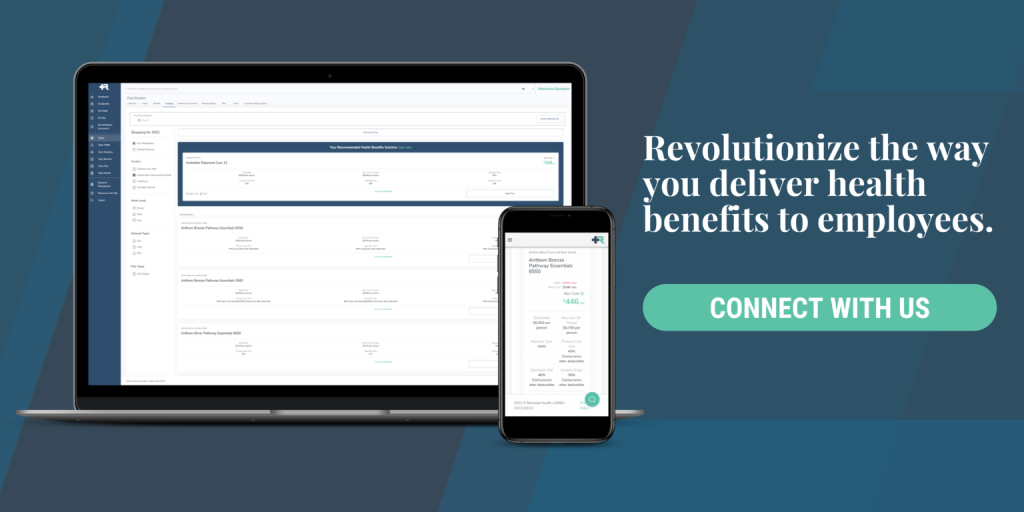ICHRA and COBRA
By Remodel Health Team on Aug 16, 2024 10:32:00 AM

Navigating employee benefits can be challenging, especially when off-boarding employees. Brokers and employers often encounter two critical terms: ICHRA (Individual Coverage Health Reimbursement Arrangement) and COBRA (Consolidated Omnibus Budget Reconciliation Act). Understanding how these two concepts intersect is essential for providing comprehensive support to employees during transitions. This blog will explain what ICHRA and COBRA are and how they relate to each other, particularly when off-boarding an employee.
What is ICHRA?
ICHRA, or Individual Coverage Health Reimbursement Arrangement, is an employer-funded health benefit that allows employers to reimburse employees for individual health insurance premiums and other medical expenses. Unlike traditional group health insurance, where the employer provides a specific plan, ICHRA lets employees choose their own insurance plan that suits their needs. The employer then reimburses the employee up to a set amount each month.
ICHRA is flexible and can be customized to meet the needs of different classes of employees. It has become a popular option for employers looking to provide health benefits without the administrative burden of managing a group plan.
What is COBRA?
COBRA is a federal law that allows employees to continue their employer-sponsored health insurance coverage after leaving their job, usually for up to 18 months. The employee must pay the full premium cost, including any portion previously covered by the employer, plus a 2% administrative fee.
COBRA ensures that employees do not suddenly lose their health insurance coverage due to job loss, reduced work hours, or other qualifying events. However, COBRA can be costly because the employee is responsible for the premium.
How Do ICHRA and COBRA Intersect?
When an employee covered by an ICHRA leaves their job, they may wonder if COBRA applies. The short answer is yes, COBRA does apply to ICHRA. If an employee opts to continue their ICHRA coverage under COBRA, they must pay their full premium plus a 2% surcharge. For example, if the plan premium was $500 per month, the employee would pay $510 per month to continue their ICHRA coverage under COBRA.
However, it’s important to note that it’s not in the employee’s best interest to elect COBRA for their ICHRA coverage in most cases. Here’s why:
Options for Off-Boarding Employees
Providing clear options is crucial when off-boarding employees with ICHRA plans. Employees typically have four choices:
1. Cancel Their Health Insurance Policy
Employees may cancel their individual health insurance policies entirely, especially if they are transitioning to a new job offering health insurance.
2. Take Over Payment of Their Health Insurance Policy
Employees who own their health insurance policy can continue paying the premiums directly, bypassing the 2% COBRA surcharge.
3. Explore Advanced Premium Tax Credits
If the employee has selected an on-exchange plan and is not immediately starting a new job with health insurance, they may be eligible for APTC (Advanced Premium Tax Credits), which can significantly reduce their premium costs.
4. Elect COBRA
As mentioned, COBRA is an option, but it’s generally less favorable due to the added cost. However, COBRA might make sense in specific scenarios, such as when the employee has a large outstanding Health Wallet balance. Electing COBRA would extend the period when the employee can spend those funds. Without COBRA, expenses must be incurred before the employee’s last day on the plan to be eligible for reimbursement.
Are Employers Still Required to Offer COBRA to Employees After the Switch to ICHRA?
Yes, employers are still required to offer COBRA coverage to their employees even if they switch to an ICHRA. COBRA mandates that employers with 20 or more employees continue offering healthcare coverage to employees and their families after certain qualifying events, such as termination or a reduction in hours. When transitioning to ICHRA, the company’s health benefits structure may change, but COBRA obligations do not disappear. This means that employees who were covered under the ICHRA before a qualifying event must be given the option to elect COBRA coverage.
While COBRA must still be offered, educating employees on their options, including ICHRA and potential subsidies, can help them make the best decision for their financial and healthcare needs. It’s also important to provide guidance on how these different options work to ensure that employees feel supported during this transition.
Conclusion
Understanding the relationship between ICHRA and COBRA is essential for brokers and employers to effectively guide their employees through off-boarding. While COBRA is a viable option, it’s often more beneficial for employees to explore alternatives like taking over their health insurance payments or utilizing APTC. Clear communication and support during this transition can help employees make informed decisions about their healthcare coverage.
To learn more, contact the team at Remodel Health today.
Check out more resources
See these related articles

ICHRA vs. QSEHRA: What’s the difference?
Trying to choose between a QSEHRA and an ICHRA? Compare features, eligibility, and flexibility to find the right fit for your business’s health benefits.

What are the best states for ICHRA in 2026?
Offering ICHRA for the first time? This guide walks employers through setup, compliance, and employee communication for a smooth first-year rollout.

ICHRA vs. group health plans
Weighing ICHRA vs. group plans? Compare these health benefit options to understand differences in cost, flexibility, compliance, and employee experience.


